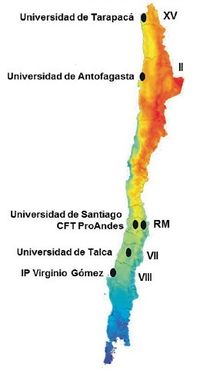Difference between revisions of "Solar Laboratories in Chile"
***** (***** | *****) |
***** (***** | *****) |
||
| Line 12: | Line 12: | ||
= <span style="color:#008000;">The Solar Laboratories</span> = | = <span style="color:#008000;">The Solar Laboratories</span> = | ||
| − | The six institutions selected belong to five different regions in the country: [[File:Solar laboratories chile.jpg|right| | + | The six institutions selected belong to five different regions in the country: [[File:Solar laboratories chile.jpg|right|200pxpx|alt=Solar laboratories chile.jpg]] |
*University of Tarapaca (XV Region); | *University of Tarapaca (XV Region); | ||
| Line 26: | Line 26: | ||
In this way, students acquire all the knowledge and understanding of the different types of PV installations, both off-grid and on-grid, and all the variables that influence their correct design, sizing, maintenance and operation. | In this way, students acquire all the knowledge and understanding of the different types of PV installations, both off-grid and on-grid, and all the variables that influence their correct design, sizing, maintenance and operation. | ||
| + | |||
| + | = <span style="color:#008000;">Expected results of the project</span><br/> = | ||
| + | |||
| + | It is expected to have about 50 technicians-professionals trained annually in these laboratories. To achieve this, each of the educational institutions committed to developing a long-term strategy that introduce training in these laboratories into the curriculum of some careers. Additionally, the donated equipment by the GIZ should be used for courses of specialization for professionals of the solar sector and/or other educational institutions.<br/> | ||
Revision as of 15:02, 28 August 2015
The Ministry of Energy in Chile and the Deutsche Gesellschaft für Internationale Zusammenarbeit (GIZ) GmbH, in the framework of international cooperation, are developing the project "Solar Energy for Electricity and Heat". The main interest is the development of the market for electrical or thermal self-supply from solar energy. The spread of these technologies needs to define policies and strategies in order to move towards that direction. A suitable and effective progress in this market must be accompanied and underpinned by the development of skills and expertise in solar technologies.
Objectives
With the aim of promoting training in the area of photovoltaic systems and thus encourage and support the growth of the industry, the GIZ in conjunction with the Ministry of Energy launched the competition "Photovoltaic Laboratory for Training and Demonstrations in Centers of Technical and Vocational Training and/or Universities". The objective is to encourage in higher education institutions, the training of professionals and technicians to meet the demand for specialists in the design, selection, installation and maintenance of solar photovoltaic plants.
The Solar Laboratories
The six institutions selected belong to five different regions in the country:
- University of Tarapaca (XV Region);
- University of Antofagasta (II Region);
- ProAndes Technical Training Center (Metropolitan Region)
- University of Santiago (Metropolitan Region);
- University of Talca, Curicó campus (VII Region)
- Professional Institute Virginio Gómez de la Concepción (VIII Region)
The PV Laboratories are composed of a photovoltaic system and a didactic system. The first one corresponds to two small plants: a 1 kWp system with a micro inverter technology and a 1.5 kWp system with a inverter chain. Both plants with different assemblies connected to the distribution network. The didactic system basically consists of modules containing all the necessary elements to develop a comprehensive training in PV technology.
In this way, students acquire all the knowledge and understanding of the different types of PV installations, both off-grid and on-grid, and all the variables that influence their correct design, sizing, maintenance and operation.
Expected results of the project
It is expected to have about 50 technicians-professionals trained annually in these laboratories. To achieve this, each of the educational institutions committed to developing a long-term strategy that introduce training in these laboratories into the curriculum of some careers. Additionally, the donated equipment by the GIZ should be used for courses of specialization for professionals of the solar sector and/or other educational institutions.




















